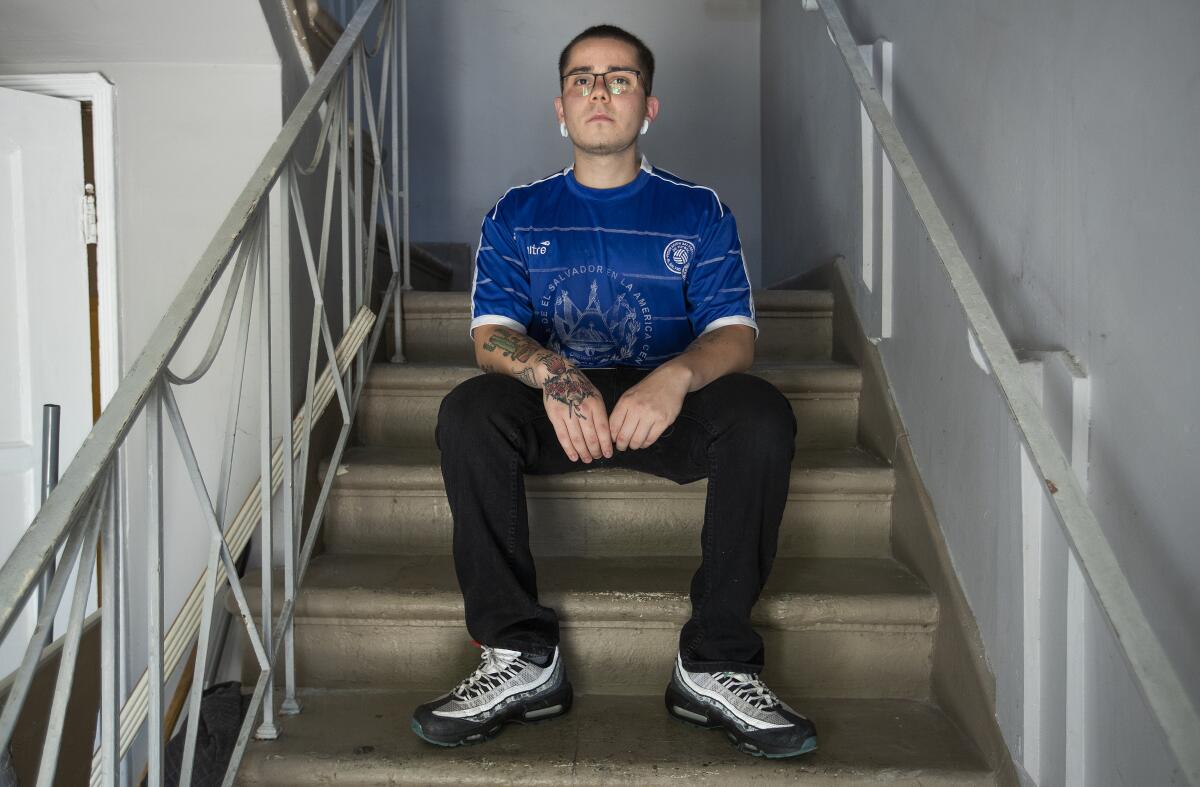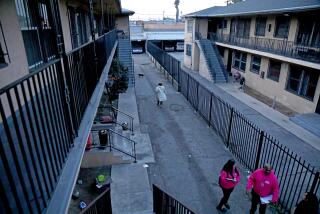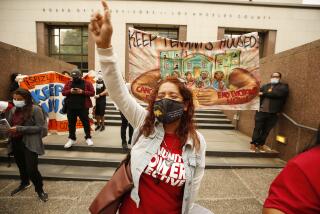Tenants keeping up rent payments during pandemic, but wave of evictions could loom

- Share via
Even before he lost both of his part-time jobs in March, Jose Alvarez-Castillo was just barely getting by.
The 21-year-old senior at UCLA was sharing a three-bedroom apartment with six roommates near the Westwood campus. His share of the rent was $800 a month. When the pandemic hit, his jobs as a handyman and receptionist for on-campus gyms went away. Alvarez-Castillo feared he’d have to max out his credit cards, take out more loans and still fall behind on his rent.
But then came an unexpected boon: Alvarez-Castillo’s unemployment check.
“Unemployment really saved me,” Alvarez-Castillo said. “This extra money was amazing.”
Like tens of millions out of work across the country, Alvarez-Castillo is receiving expanded unemployment benefits passed as part of the federal response to the COVID-19 pandemic in March. The program gives those who have lost their jobs an extra $600 a week on top of regular state unemployment payments, a cash influx helping people pay their bills in ways that many hadn’t expected at the beginning of the crisis. Chief among them is rent.
More than 94% of renters paid at least part of their rent in April, May and June, according to the National Multifamily Housing Council, a Washington-based landlord trade group that surveys owners of 11.4 million apartments, or about a quarter of the nation’s rental market. Those figures are only a few percentage points behind what renters paid during the same months in 2019, according to the survey.
But those expanded unemployment benefits are scheduled to expire at the end of July, leaving tenants, landlords and housing advocates worried about a wave of evictions in the coming months as renters lose much of their incomes.
“What you’re asking renters to do is impossible for them to do,” said Doug Bibby, the multifamily housing council’s president. “Which is do it again, but without the resources you’d given them.”
Currently, nearly all evictions in California are on hold because the state court system is not processing cases except for those deemed urgent. But those provisions are set to expire three months after the coronavirus state of emergency ends, and court leaders have indicated they may speed up that timeline. Without a blanket eviction prohibition, tenants will have to navigate protections that vary by city, with many requiring those who fall behind on rent to go to court to remain in their homes.
It’s hard to get a complete picture of how tenants are faring with their rents right now. The multifamily housing council data skew toward higher-end apartments because they survey only those with professional management companies. Even so, other statistics show that renters in the state are treading water — with expanded unemployment benefits a key reason why.
In California, nearly 85% of adults living in rental homes reported paying their rent last month in a U.S. Census Bureau survey conducted July 2-7, with the percentage slightly lower in the Los Angeles area.
An analysis by the Urban Institute, a Washington think tank, estimated that more than one-fifth of renter households in California had at least one person lose their job during the pandemic. Yet, despite the massive increase in those out of work, the percentage of families in the state burdened by high rents remained the same once the increased unemployment benefits were factored in.
“The federal unemployment benefits are really going a long way,” said Sarah Strochak, a research analyst at the Urban Institute and the report’s lead author. “It’s improving affordability for a lot of people, particularly at the lower income levels.”
To be sure, the additional cash available to those out of work has not made it affordable to rent in California, nor has it eased the financial burdens of everyone dealing with the economic fallout from the coronavirus.
The Urban Institute study found that more than half of renter households in California are still spending more than 30% of their income on housing, even with the extra unemployment insurance. Additionally, nearly 2 million workers in the state have yet to receive their unemployment benefits as the California Employment Development Department has struggled to process claims. Others, including those in the country illegally, are prohibited from receiving any unemployment benefits — expanded or otherwise.
Because Alvarez-Castillo was able to get his unemployment checks starting in April, he’s not only current on his own rent but also able to lend money to roommates who haven’t received benefits. Alvarez-Castillo also sent some cash to his mother who lost her housecleaning work.
Other financial relief programs for renters aren’t coming close to the projected need. The city of Los Angeles is planning to spend $100 million on subsidies for low-income tenants affected by the coronavirus — the largest municipal program in the country — yet even City Council members who passed the plan say federal and state government will need to shoulder a greater financial burden to keep tenants housed.
The gaps in the safety net for renters point to a need for Congress to not only renew expanded unemployment benefits but also provide broad rental assistance and other protections for tenants, said Diane Yentel, president and chief executive of the National Low Income Housing Coalition, an advocacy group.
“It’s been clear to us from the beginning that, without a significant federal intervention, there would be a wave of evictions and a spike in homelessness at some point during this crisis,” Yentel said. Expanded unemployment insurance, she said, has been “significant, helpful and it’s not enough.”
After weeks of Senate Republicans saying they were unwilling to continue the $600-a-week subsidy, Congress is in the early stages of negotiating a compromise to include in the next coronavirus stimulus package. One possibility is reducing the unemployment benefit and making up at least part of the difference by sending out another round of $1,200 stimulus checks that were also part of the March package. In late June, the House approved $100 billion for rental assistance, but it is unclear whether it will be included in any deal.
It’s not just renters who are benefiting from expanded unemployment payments. Nearly half of the tenants in the 16-unit apartment complex Kim Pierce owns in Echo Park are behind on their rent, Pierce said. She was able to defer her $10,000-a month mortgage for six months. But after that, her lender is adding the missed payments to her monthly bill over the next year.
“Had I not gotten the help, for sure I would have gone bankrupt,” Pierce said. “I could not possibly have hung on.”
Pierce is concerned that the expiration of the expanded unemployment benefits means even more of her tenants will fail to pay just as she’s needing to make up her missed mortgage payments.
“I’m headed toward a cliff,” she said. “And if something doesn’t give, we’re all going over.”
As for Alvarez-Castillo, with future unemployment benefits uncertain, he’s considering trying to find new work. But his options seem limited. He doesn’t have a car so he can’t stray far from campus. He has underlying health conditions and two of his roommates have asthma, so the idea of working at a grocery store is scary.
“I am very worried,” he said. “I was able to put a little something away. But it’s not enough.”
Times staff writer Sarah D. Wire contributed to this report.
More to Read
Sign up for Essential California
The most important California stories and recommendations in your inbox every morning.
You may occasionally receive promotional content from the Los Angeles Times.







